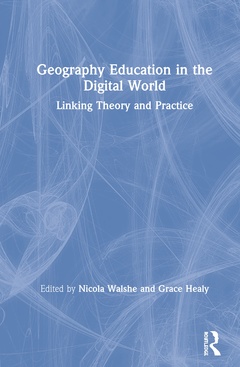Geography Education in the Digital World Linking Theory and Practice
Coordonnateurs : Walshe Nicola, Healy Grace

Geography Education in the Digital World draws on theory and practice to provide a critical exploration of the role and practice of geography education within the digital world.It considers how living within a digital world influences teacher identity and professionalism and is changing young people?s lives. The book moves beyond the applied perspective of educational technology to engage with wider social and ethical issues of technology implementation and use of digital data within geography education.
Situated at the intersection between research and practice, chapters draw on a wide range of theory to consider the role, adoption and potential challenges of a range of digital technologies in furthering geographical education for future generations. Bringing together academics from the fields of geography, geography education and teacher education, the book engages with four key themes within the digital world:
- Professional practice and personal identities.
- Geographical sources and connections.
- Geospatial technologies.
- Geographical fieldwork.
This is a crucial read for geographers, geography educators and geography teacher educators, as well as those engaging with existing and new technologies to support geographical learning in the dynamic context of the digital world. It will also be of interest to any students, academics and policymakers wanting to better understand the impact of digital media on education.
List of Illustrations
Foreword
David Lambert
Acknowledgments
List of Contributors
1. Introduction: navigating the digital world as geographers and geography educators
Nicola Walshe and Grace Healy
Part I: Professional practice and personal identities in the digital world
2. Teacher identity, professional practice and online social spaces
Clare Brooks
3. Digital technologies and their roles in knowledge recontextualisation and curriculum making
Steve Puttick
4. Navigating the theory-practice divide: developing trainee teacher pedagogical content knowledge through 360-degree immersive experiences
Nicola Walshe, Paul Driver and Mandy-Jane Keenoy
5. Children, childhood and children’s geographies: evolving through technology
Lauren Hammond
Part II: Geographical sources and connections in the digital world
6. Geographical sources in the digital world: disinformation, representation and reliability
Margaret Roberts
7. ‘Connecting the Classroom’: teaching geographies of development via digital interactive spaces
Rory Padfield
8. Social media as a tool for geographers and geography educators
Francesca Fearnley
Part III: Geospatial technologies in the digital world
9. Insights from professional discourse on GIS: a case for recognising geography teachers’ repertoire of experience
Grace Healy
10. Empowering geography teachers and students with geographical knowledge: epistemic access through GIS
Mary Fargher and Grace Healy
11.GIS for young people’s participatory geography
Susan Pike
Part IV: Geographical fieldwork in the digital world
12. Using mobile virtual reality to enhance fieldwork experiences in school geography
Rebecca Kitchen
13. Teaching and learning geography with mobile technologies and fieldwork
Chew-Hung Chang
14. Augmented reality: opportunities and challenges
Gary Priestnall
15. Location-based games for geography and environmental education
Steffen Schaal
Part V: Conclusion
16. From the digital world to the post-digital world: the future generation of geographers
Grace Healy and Nicola Walshe
Nicola Walshe is Head of the School of Education and Social Care at Anglia Ruskin University.
Grace Healy is the Curriculum Director at David Ross Education Trust.
Date de parution : 10-2020
17.4x24.6 cm
Date de parution : 10-2020
17.4x24.6 cm
Thème de Geography Education in the Digital World :
Mots-clés :
Geography Education; Geography Teachers; digital technologies; School Geography; geospatial technologies; Geographical Education; ArcGIS Online; Curriculum Making; Digital World; Children's Geographies; Technological Pedagogical Content Knowledge; Knowledge Recontextualisation; Mobile Virtual Reality; CGE; Pokémon; Professional Learning Communities; Geography Fieldwork; Online Social Spaces; Digital Geographies; Professional Knowledge Landscape; Geography Education Community; TPACK Framework; Primary Geography; QR Code; Danakil Depression; Professional Development


